| Srl | Item |
| 1 |
ID:
081907
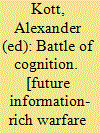

|
|
|
|
|
| Publication |
Westport, Praeger Security International, 2008.
|
| Description |
vii, 263p.
|
| Standard Number |
9780313349959
|
|
|
|
|
|
|
|
|
|
|
|
Copies: C:1/I:0,R:0,Q:0
Circulation
| Accession# | Call# | Current Location | Status | Policy | Location |
| 053543 | 355.33041/KOT 053543 | Main | On Shelf | General | |
|
|
|
|
| 2 |
ID:
190775
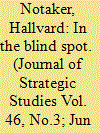

|
|
|
|
|
| Summary/Abstract |
Situational awareness in the face of hybrid campaigns is undermined by ‘blind spots’, which this article conceptualises. Blind spots are where legal or political frameworks preclude intelligence gathering below the threshold of war. Drawing on a historical case study of alterations in legislation and security police directives in Norway from 1950–2021, the analysis shows how an influence operation’s blind spot varied along with shifts in the balance between national security concerns and democratic individual rights. Recent initiatives to criminalise domestic collaboration with foreign influence operators are discussed, and the advent of AI and microtargeting presented as a challenge out of reach of such legislation.
|
|
|
|
|
|
|
|
|
|
|
|
|
|
|
|
| 3 |
ID:
112051
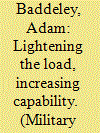

|
|
|
| 4 |
ID:
185072
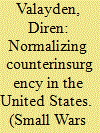

|
|
|
|
|
| Summary/Abstract |
In this article, I elaborate on the thesis that counterinsurgency has become a ‘new governing paradigm’ in the United States. I first argue that the DoD redefinition of terrorism blurred the conceptual boundaries between counterterrorism and counterinsurgency, to ease the latter’s transition from the field of military strategy to that of political governance. Second, I argue that counterinsurgency became a governing paradigm, based on political techniques that worked through the subjective capabilities of the population. After 9/11, those capabilities were associated with the first responder. I trace the conceptual evolution of the first responder as a technical category in the discourse and administration of public safety, to its re-emergence in the concept of homeland security after 9/11. I argue that the political architecture created by homeland security emphasized the awareness, preparedness and resilience of the first responder who was in turn defined as the first line of defense against potential attacks. Through the first responder, counterinsurgency achieves its fundamental goal: to prevent social transformation by securing societal ‘normalcy’. Lastly, I argue that, as a governing paradigm, counterinsurgency provides a frame of interpretation to understand and categorize social experience: a first responders/insurgents schism now guides how we interpret political divisions.
|
|
|
|
|
|
|
|
|
|
|
|
|
|
|
|
| 5 |
ID:
182602
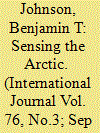

|
|
|
|
|
| Summary/Abstract |
This article considers the role of surveillance within security concerns related to the Arctic in Canada and North America. More pointedly, it examines how surveillance contributes towards situational awareness and the current emphasis on technological research and development to meet current and future security requirements. The article argues that Canada’s focus on surveillance within the Arctic offers a flexible strategy that navigates the complex and evolving security environment in addition to the political and fiscal realities of our time. However, the article warns that emphasizing the role of novel technology within strategic considerations risks undermining sound policymaking as the potential for new technology to transform defensive capabilities remains speculative. The article illustrates this approach to security by analyzing Canada’s Arctic surveillance capabilities and goals under the All Domain Situational Awareness (ADSA) program. Further, it links Canada’s efforts to North American defence by theoretically examining the role of surveillance in the Strategic Homeland Integrated Ecosystem for Layered Defence (SHIELD) concept and the recent NORAD/USNORTHCOM strategic outlook.
|
|
|
|
|
|
|
|
|
|
|
|
|
|
|
|
| 6 |
ID:
165018
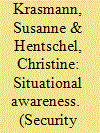

|
|
|
|
|
| Summary/Abstract |
The emergence of ‘situational awareness’ as a response to the perception of a new terrorism in European cities marks a significant shift in the conceptualization of security. Focusing on a recently introduced German Federal Police programme that trains ordinary officers in their capability to handle ‘complex life-threatening situations of police operation’, the article explores how situational awareness introduces a warrior logic into policing and urban subjectivity and modifies our understanding of security at large. It points us to the limitations of preparedness and concretizes the hitherto elusive call to resilience. Three analytical dimensions – space–time, sensing and connectivity – will be developed to render the situation thinkable for empirical research as well as to grasp security as a ‘live’ mode of government.
|
|
|
|
|
|
|
|
|
|
|
|
|
|
|
|
| 7 |
ID:
171231
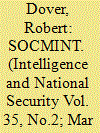

|
|
|
|
|
| Summary/Abstract |
The ubiquity of social media platforms promises greater government insight for horizon scanning, warning notice, investigations and situational awareness. This paper concludes that SOCMINT has utility in horizon scanning, offers limited value to warning notice and situational awareness. For the Five Eyes nations the adversary utilisation of SOCMINT is considerable and outweigh the advantages of this technology. Western powers are currently losing the information component of hybrid conflict. Consequently, capable and hostile cyber powers understand the western centre of gravity and have been able to undermine confidence in the public’s certainty in facts and democratic institutions.
|
|
|
|
|
|
|
|
|
|
|
|
|
|
|
|